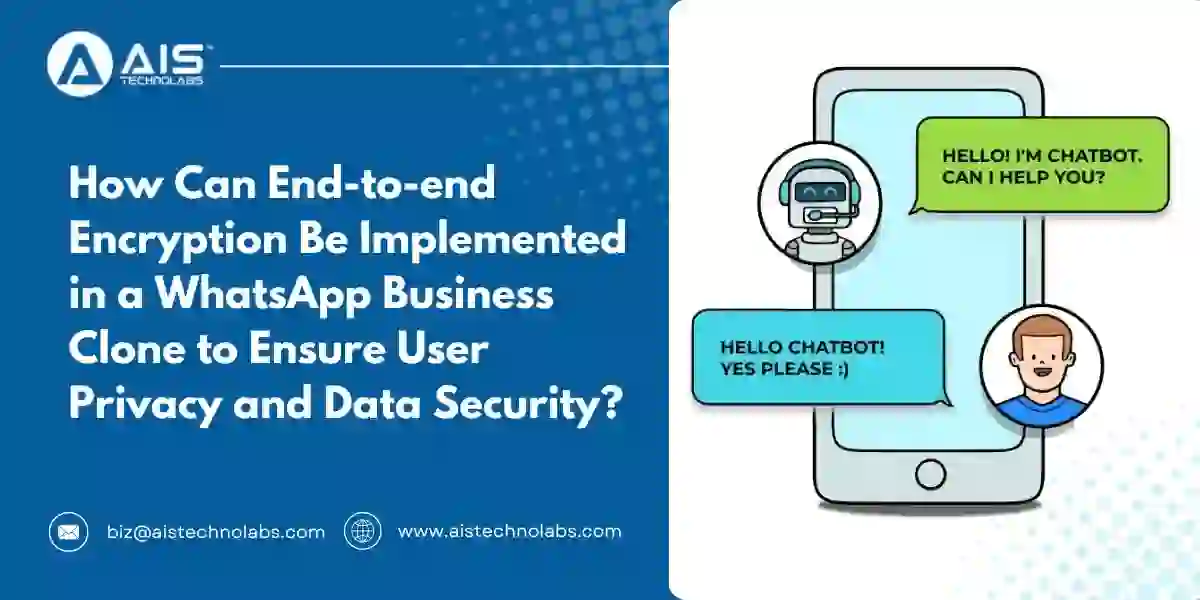Table of Content
(500 views)

Quick Summary
End-to-end encryption is necessary for a WhatsApp Business Clone in order to protect user privacy and data. Only those who have been given permission to read private communications that are encrypted before being delivered from the sender to the recipient can access them. The best methods for putting encryption into effect are covered in this blog post. These include choosing the right algorithms, safeguarding key transfers, and performing regular security audits and secure authentication. Despite the difficulties it poses, including key management and legal compliance, encryption is a must for any communications clone. The advantages of end-to-end encryption exceed the drawbacks by a wide margin.
Introduction
Safeguarding user privacy and data security is crucial in the present digital era, particularly for communication apps like a WhatsApp Business Clone. Consumers want privacy, and companies need to protect sensitive data. Data and interactions are shielded from potential security breaches using end-to-end encryption, or E2EE. We'll examine user privacy and data security standards in this blog post, along with instructions on how to use end-to-end encryption with a WhatsApp Business Clone.
Comprehending End-to-End Cryptography
What Is End-to-End Encryption and How Does It Work?
Only the parties engaged in the conversation can read messages in an end-to-end encrypted system. Stated differently, an email that has been encrypted up to the sender level can only be decrypted by the intended recipient. This makes sure that no one else can access the data while it's being moved, not even governments, service providers, or hackers.
Users of WhatsApp Business Clone will hold private chats without fear of their data being intercepted or manipulated because encryption is pre-installed. E2EE's major objective is to maintain the privacy of communication, which fosters user confidence and turns your clone into a safe platform for companies.
Why Use End-to-End Encryption in a Clone of the WhatsApp Business App?
The advantages of end-to-end encryption in a clone of WhatsApp Business
The following benefits come with an end-to-end encrypted WhatsApp Business App Clone:
- Better User Privacy: It ensures that the sender and the recipient are the only ones who can read conversations. The safeguarding of users' privacy is an essential feature of contemporary communication applications.
- Preventing Data Breaches: Encrypted messages sent using E2EE will not be accessible in the case of a data breach until the decryption key is obtained. This lessens the possibility of data breaches, which are a major problem in the contemporary world.
- User Trust: Businesses want users to feel comfortable interacting with them on their websites. When E2EE is used in a WhatsApp Business App Clone, consumers can be more certain that no unauthorized party can access their data. For additional privacy, users often pair encrypted communication tools with VPNs—like Firefox’s built-in VPN, which answers the question, 'does Firefox have a VPN?'—to further secure their online activities
Ready to Secure Your WhatsApp Business Clone?
How to Set Up End-to-End Encryption in a Clone of WhatsApp for Business
Step 1: Selecting the Right Encryption Algorithm
Choosing a reliable encryption technique is the first step in putting end-to-end encryption into practice. AES (Advanced Encryption Standard) and RSA (Rivest-Shamir-Adleman) are two frequently utilized algorithms. AES is commonly utilized for symmetric encryption in WhatsApp Business Clone scenarios, however RSA can be employed for the safe transfer of encryption keys.
Step 2: Secure Key Exchange Mechanisms
End-to-end encryption cannot function without key exchange. In order to avoid unwanted interception, the key exchange in a WhatsApp Business Clone needs to be done securely. The reason behind the popularity of the Diffie-Hellman key exchange method is that it allows two users to safely exchange cryptographic keys over an open channel.
Step 3: Secure Data Transfer Protocols
The Secure Socket Layer (SSL) and Transport Layer Security (TLS) protocols are widely used to guarantee the secure exchange of data between users. These protocols give your WhatsApp Business App Clone an additional layer of security by encrypting data as it travels between servers.
Step 4: Data Encryption While in Transit and at Rest
It is imperative to guarantee that data is encrypted both during transmission and storage (at rest). Chat history, pictures, and other data saved to the device or server in a WhatsApp Business Clone have to be secured. This comprehensive approach guarantees data security even in the case of a server or device breach.
Challenges in Implementing End-to-End Encryption
Technical Challenges in Building a WhatsApp Business App Clone with Encryption
While end-to-end encryption is essential, including it into a WhatsApp Business Clone presents a number of challenges. The largest obstacle is key management. Every message has a different encryption key, and it can be difficult to manage these keys without running the danger of exposure. Furthermore, because it can take a lot of resources to encrypt and decrypt each communication, performance problems may also occur.
Legal Aspects and Compliance
Implementing encryption must also be done while considering legal regulations. Depending on the region, there may be laws that forbid using encryption or require law enforcement to have access through backdoors. A WhatsApp Business Clone needs to use end-to-end encryption while respecting relevant legal requirements and safeguarding user privacy.
The Best Ways to Protect User Information in a WhatsApp Business Clone
Ensuring Secure Authentication
Weak authentication can result in unwanted access even in cases when the message content is encrypted. Strong authentication methods, including two-factor authentication (2FA), must be used in a WhatsApp Business App Clone. This adds a security layer on top of the basic password protection.
Frequent updates and audits of security
Maintaining the integrity of end-to-end encryption in a WhatsApp Business Clone requires regular security assessments. Finding and fixing vulnerabilities guarantees that the encryption is strong and that attackers cannot take advantage of any weak places. Regular software updates also guarantee that the application is shielded against recently identified security risks.
Conclusion
To protect user privacy and guarantee data security, a WhatsApp Business Clone must include end-to-end encryption. By encrypting data, you may give users on your platform a trustworthy communication route and protect sensitive information from prying eyes. Any communication tool must have encryption since its benefits outweigh its drawbacks, especially in terms of technological and legal difficulties.
With the help of AIS Technolabs, you can create a private and secure WhatsApp Business Clone. They can also assist you with these problems and set up a user-friendly platform. To learn more about our development services and how we can assist you in creating the perfect app for your needs, please get in touch with us.
FAQs
Ans.
A message is encrypted on the sender's end and can only be decrypted by the final recipient when end-to-end encryption is used. Because it keeps outside parties—like service providers—from accessing the messages in a WhatsApp Business Clone, this is essential for protecting user privacy.
Ans.
Better privacy, more user confidence, and a lower risk of data breaches are some benefits. It helps ensure that user data is secure even in the case of a system hack.
Ans.
Difficulties include keeping cryptographic keys safe, performance concerns, and adhering to regional laws that may limit the use of encryption.
Ans.
SA for safe key exchange, TLS/SSL for secure data transfer, and AES for data encryption are common methods.
Ans.
A company should have strong authentication protocols, conduct regular security audits, and keep up with modifications to software if it wants to protect itself against ever changing threats.
Mary Smith
Mary Smith excels in crafting technical and non-technical content, demonstrating precision and clarity. With careful attention to detail and a love for clear communication, she skillfully handles difficult topics, making them into interesting stories. Mary's versatility and expertise shine through her ability to produce compelling content across various domains, ensuring impactful storytelling that resonates with diverse audiences.
